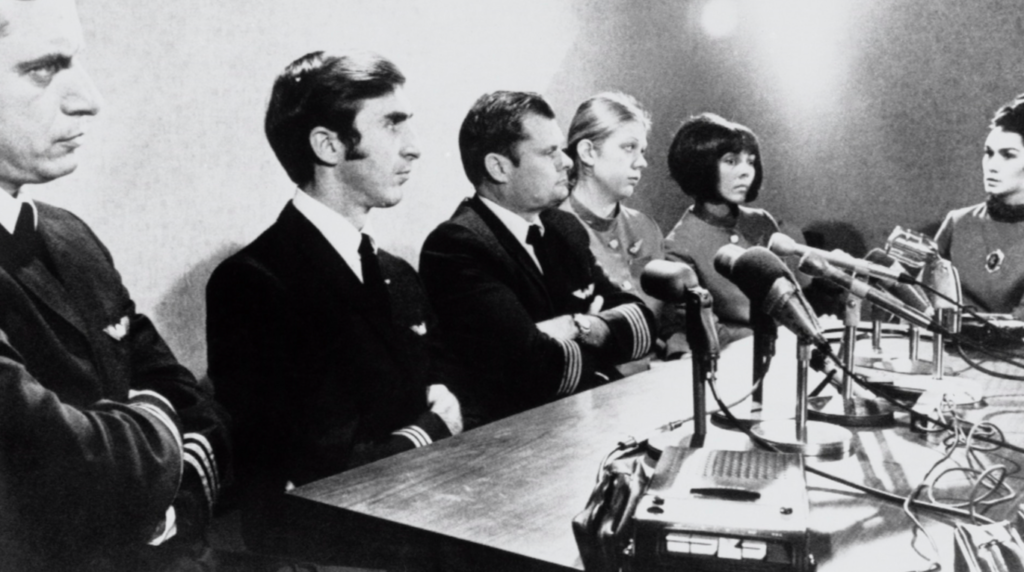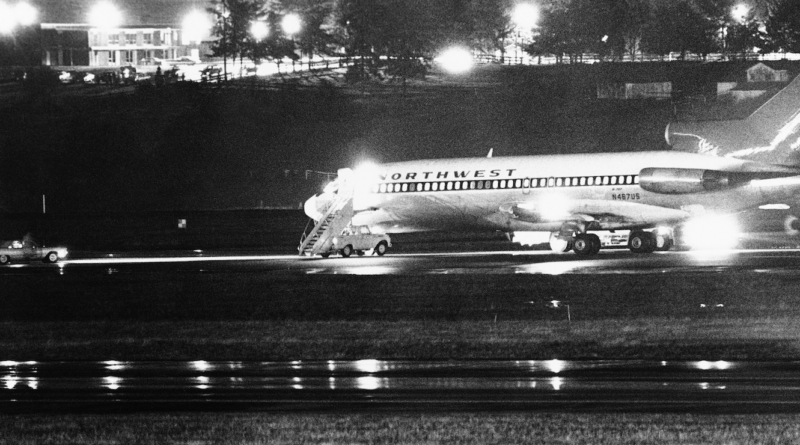INTERVIEW: New HBO documentary looks into unsolved FBI case involving D.B. Cooper
Photo: The hijacked Northwest Airlines jetliner 727 sits on a runway for refueling at Tacoma International Airport in Seattle on Nov. 25, 1971. Photo courtesy of HBO / Provided with permission.
The FBI’s unsolved case involving D.B. Cooper is a real head-scratcher, some would even say an enigma only a mystery writer could create. Cooper is the name given to an unidentified man who hijacked a plane in 1971 and then parachuted down into the wilderness with $200,000 in tow. He has never been found, and many unanswered questions remain with several conspiracy theories populating true-crime websites on the internet.
Director John Dower, the man behind such films as Thrilla in Manila and My Scientology Movie, immerses himself in the Cooper legends for the new HBO documentary The Mystery of D.B. Cooper, which premieres today, Nov. 25 on HBO and HBO Max.
“It’s a funny one this,” Dower said in a recent Zoom call. “I traditionally make a lot of films in the U.S. I love making documentaries in the U.S. I like trying to bring an English perspective to stories that you guys think you know, and … I just personally think American stories are often more epic. They’re bigger in scale, and sometimes they have a peculiar strangeness you don’t get over here. It’s a different kind of strangeness.”
Strange and epic are two adjectives that certainly fit the stories surrounding Cooper. The unidentified man hijacked the plane after it took off in Portland, Oregon, and rather than hurting any of the passengers, he simply requested four parachutes and the money. Then he jumped into the rough wilderness of Washington state.
“When I was approached by the production company I made this with — I made another film with them years ago — I was kind of annoyed because I didn’t know the story,” Dower admitted. “I like to think I know all the iconic American stories, but I didn’t know this one. I’m like, ‘What, this really happened? I don’t believe you.’ I was initially a bit like, oh, I’m not sure, I’m not sure, I’m not sure because when if you’re down the park with friends, it’s one of those great stories because it’s got that great pitch. OK, so it’s a stormy Thanksgiving Eve, guy — black suit, black sunglasses, black attache case — gets on to a flight, and suddenly you’re off with all the bits of detail. But for a film I thought, well, that’s going to be difficult to sustain because actually it’s a very passive heist. The passengers don’t even know it’s happening. There’s no drama in that bit, and it’s quite quick.”
What convinced the filmmaker that there was a movie surrounding the saga of D.B. Cooper is when he learned about the many suspect theories that have emerged in the last 50 years. He started to investigate the possible solutions to this whodunit, and he became fascinated. For the final film, he settled on a few of the more prominent suspects and theories pushed by people who are not treating the Cooper incident as a hobby akin to an armchair detective. This is no search for Bigfoot. The people profiled in the documentary have an emotional connection to the case on a profound level, and Dower was hooked by their retellings of the facts.
“There are a lot,” the director said about the theories that are out there about Cooper. “If you go on Wikipedia there are hundreds essentially. … There is this Cooper underworld that you get sucked into. It’s very peculiar to the internet with message boards. Once they found we were making this, they started to approach us. … So anybody that immediately asked for cash was ruled out. You’re not a true believer for me.”
To make it into Dower’s film, he needed to meet with the person and discuss that person’s theory. To contextualize the evidence, he had phone conversations and read archival material. He wanted to be convinced that their story could be true, even if it was still a mystery.
“These were the original four actually,” he said about the theories featured in the documentary. “One dropped out — the story of Kenny Christiansen, the flight attendant. With these documentaries it can take a long time to get the financing to make the film, and in the first year and a half after we shot the initial material, sadly two of the characters in that story died. And I just didn’t feel I could tell it. It would become quite a secondhand telling, so unfortunately that one was dropped. And Jo Weber came into the picture, which is why I love to make docs because sometimes there are just happy accidents. As you can probably see from the film, I love that story. There is a sense of arbitrariness. Listen, I was never setting out to crack the investigation. The FBI couldn’t do it in 50 years, so why would a guy from South London be able to do it? So there was a sense of these are the people I want in my film.”
Choosing the theories to profile was similar to Dower’s experience on another documentary of his.
“I made a music film years ago about a musical movement in the U.K. called Brit Pop, and I chose which bands we’d feature,” he said. “And I remember in the first film festival Q&A — God, remember those — various fans started giving me shit saying, ‘Why isn’t Radiohead in it?’ I sense there’ll be a bit of that. ‘How could you not have that character and that suspect?’ Well, we thought this would make the best film.”
Many viewers of the HBO documentary will be hearing about Cooper for the first time, and Dower believes there’s a good chance they may become obsessed with the case. That’s what can happen with a true-crime story that has confounded the authorities for almost five decades.
“I did an interview for the BBC radio station last night, and the presenter of that show, he was another Englishman who’s like, ‘How can I not know about this story?’” Dower said. “And he’s become obsessed with it already. He’s like, ‘Do you think they lost the cigarettes on purpose? Was that deliberate?’ I was like, ‘You know what, sometimes these things just happen.’ … We think of these people as the premiere law agencies, but you know sometimes like us they’re ramshackle. And they make mistakes. They screw up. … Just the very fact that they lost the cigarettes, which could further down the line have given them DNA. I’m making a Netflix series at the moment in which the Irish police lose a 6-foot gate that had blood on it, so it happens. I think that’s part of it. I think also it was this weird crime that started in Oregon, goes to Washington, then actually ends up ultimately in Reno. The plane ultimately lands in Reno, Nevada, so you’ve got all these different FBI agencies. And I just don’t think there was enough of a joined-up thinking, which gave him the time to get away. Of course, these party poopers like to say, ‘Well, he just died.’ Because of what happened with the money eight years later, I don’t believe that. I think it’s a mixture of all of those factors. There were little cockups all the way along and just bad luck. Shit, we all have bad luck, don’t we?”
By John Soltes / Publisher / John@HollywoodSoapbox.com
The Mystery of D.B. Cooper, directed by John Dower, premieres today, Nov. 25 on HBO and HBO Max. Click here for more information.


